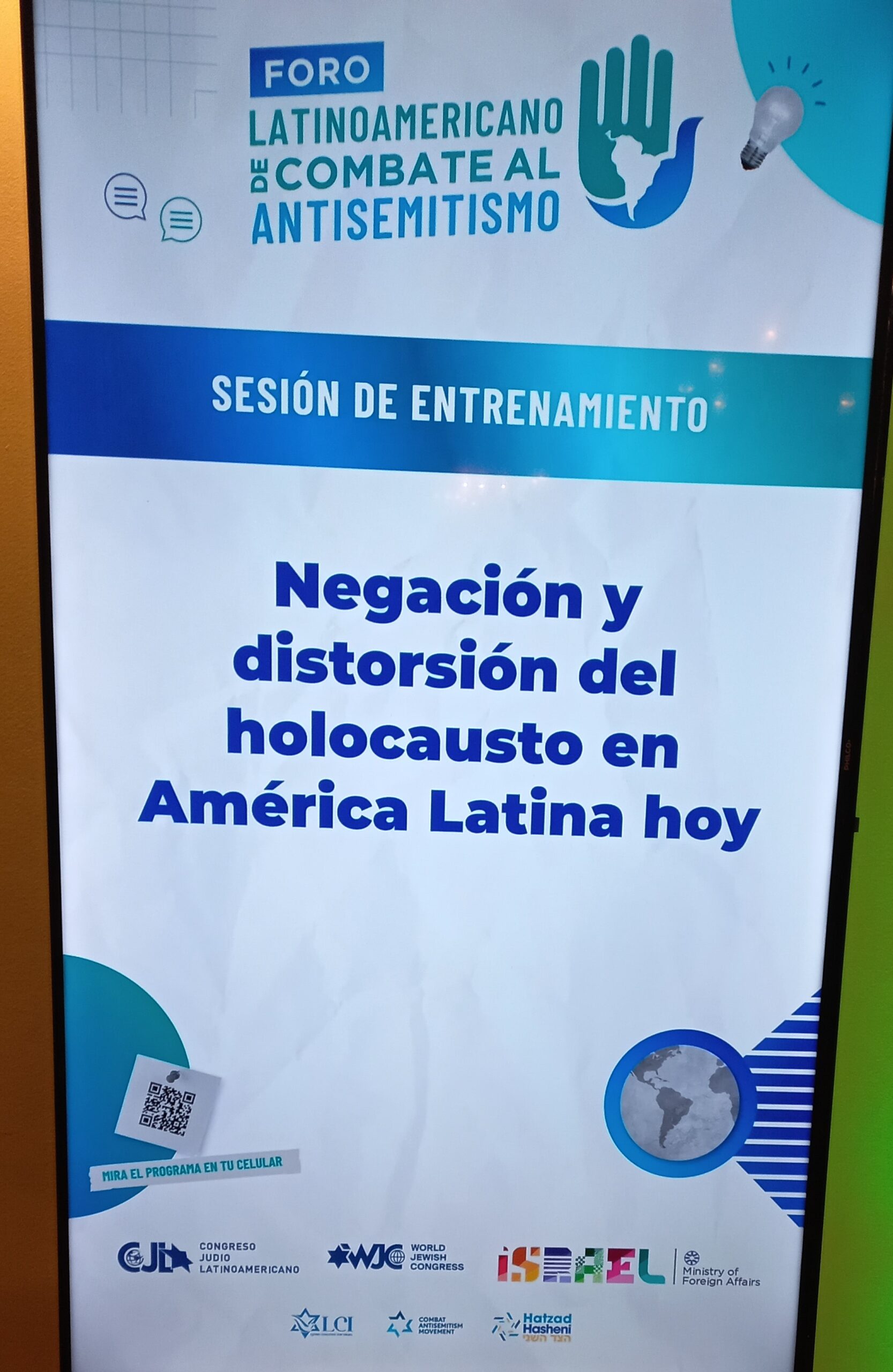Latin American Forum to Combat Antisemitism
Dr. Mirta Goldstein, Vice President of ICJW, attended the Latin American Forum to Combat Antisemitism in July 2022 in Buenos Aires, Argentina. This is her report.
(Click here for Spanish version)
In a pluralistic, international and friendly environment, I had the privilege of representing the International Council of Jewish Women and the Network of Argentine Jewish Women in this Forum, organized by the Latin American Jewish Congress and the Ministry of Foreign Affairs of Israel with the support of other institutions.
During the same time we listened to Danny Dayan, president of Yad Vashem. We heard interesting presentations about current antisemitism and its manifestations on social networks, political discourses, in sport, culture feeding anti-democratic positions. “Le Kol Ish Vaish Shem” (every human being has a name) is the motto with which the victims of the Shoah and the survivors are honored.
In each generation it is important to reinstall memory and record the transformations of each era and the transgenerational marks of the trauma of the Shoah. On the other hand, the threat to collective memory is trivialization, distortion and denialism. These operations stimulate antisemitism.
Soon, once we do not have the living testimony of the survivors, we will have to energize education about the uniqueness of the Shoah as a system of hate speech and actions of extermination and annihilation.
Awareness of the historical period of Nazism and its barbarism and about the physical and psychological suffering and torture of those eliminated and concentrated in such a cruel way must be accompanied by the memory and tribute to the righteous and protectors to convey a hopeful message regarding humanity.
We live in a time in which there is an increase in hate speech, extremism and fundamentalism that attack the common good and deny the ethical meaning that the memory of the Shoah contains for the world. Incitement to hatred and annihilation, which brings together discourse, intention and action, determine what is considered grievances to humanity.
Antisemitism is, in my opinion, a disease of culture; the Shoah is a trauma that has affected the history of humanity and memory is the tool we use so that they do not repeat themselves. For my part, I have contributed to the discussion that, while the name of Holocaust is familiar to the majority and it is easier to use it in education, it is also valid that we appropriate and spread the name of Shoah to the world, as a way for less distortion and confusion of the facts to occur.
It was a pleasure to share the dialogue and exchange of ideas with many participants. I thank the ICJW, and especially its president Lilian Grinberg, for the opportunity to be present at this forum that joined the commemoration of another anniversary of the attack on the AMIA Jewish headquarters in Argentina, in which year after year we ask for justice.
Breve informe sobre el Foro Latinoamericano de Combate al Antisemitismo
Julio 2022, Argentina, Buenos Aires
En un ambiente plural, internacional y amable tuve el privilegio de representar al International Council of Jewish Women y a la Red de Mujeres Judías Argentinas en este Foro organizado por el Congreso Judío Latinoamericano y el Ministerio de Relaciones Exteriores de Israel con el apoyo de otras instituciones.
Durante el mismo escuchamos a Dany Dayan, presidente de Iad Vashem.
Escuchamos interesantes ponencias sobre el antisemitismo actual y sus manifestaciones en las redes sociales, los discursos políticos, en el deporte, la cultura alimentando posturas antidemocráticas.
Le Kol Ish iesh Shem, cada ser humano tiene un nombre, es el lema con que se honra a las víctimas de la Shoá y a los sobrevivientes.
Le dor vador, en cada generación es importante reinstalar la Memoria y registrar las transformaciones propias de cada época y de las marcas transgeneracionales del trauma de la Shoá.
Por otra parte, la amenaza a la memoria colectiva es la banalización, la distorsión y el negacionismo. Estas operaciones estimulan el antisemitismo.
A poco tiempo de que no contemos con el testimonio vivo de los sobrevivientes, tenemos que dinamizar la educación sobre lo singular de la Shoá como sistema de discurso del odio y acciones de exterminio y aniquilamiento.
La concientización sobre el periodo histórico del nazismo y su barbarie y sobre el sufrimiento y tortura física y psíquica de los eliminados y concentrados de modo tan cruel debe estar acompañado del recuerdo y homenaje a los Justos y Protectores para transmitir un mensaje esperanzado respecto de la humanidad.
Vivimos un tiempo en el cual se observa el aumento de los discursos del odio, de los extremismos y fundamentalismos que atacan el bien común y vacían el significado ético que la Memoria de la Shoá contiene para el mundo.
La incitación al odio y al aniquilamiento, que reúne discurso, intención y acción, determinan lo que se considera agravios a la humanidad.
El antisemitismo es, a mi entender, una enfermedad de la cultura; la Shoá es un trauma que ha afectado la historia de la humanidad y la Memoria es la herramienta con la que contamos para que no se repitan.
Por mi parte he aportado a la discusión que, si bien el nombre de holocausto es familiar a las mayorías y es más fácil usarlo en materia de educación, también es valedero que nos apropiemos y difundamos el nombre de Shoá al mundo, como modo de que acaezca menos distorsión y confusión de los hechos.
Fue un placer compartir con muchos participantes el diálogo y el intercambio de ideas.
Agradezco al ICJW y en especial a su presidente Lilian Grinberg, la oportunidad de estar presente en este foro que se unió a la conmemoración de otro aniversario del atentado a la AMIA en Argentina, en el cual año tras año pedimos por justicia.
Dra. Mirta Goldstein, Vicepresidente ICJW
